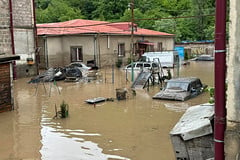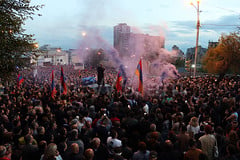During the discussion of the humanitarian situation in Nagorno-Karabakh under the urgent procedure at Thursday’s session of the Parliamentary Assembly of the Council of Europe (PACE), Andreas Wiesner, UNHCR representative in Strasbourg, France, presented the response plan prepared by the UNHCR regarding the humanitarian situation in Nagorno-Karabakh after the escalation of September 19.
He said that the Armenian Government informed them that between September 24 and October 4, more than 100,632 people were forcibly displaced from Nagorno-Karabakh, including 30,000 children, that is, about 15,000 people arrived in Armenia every day. However, since October 1, the flow of people greatly decreased. According to him, every 30th person in Armenia with a population of 3 million is considered a refugee, including 35,000 refugees, most of whom came to Armenia during the previous war.
Andreas Wiesner noted that the refugees are mostly confused and worried about their future. "They do not know what will happen to their homes in Nagorno-Karabakh, whether they will ever be able to return, or whether they will be able to solve the problem of their children's education in Armenia, among other problems. They have been able to take very little with them and are in immediate need of such items as blankets, bedding, medicine, socio-psychological support, etc. Many, including children and the elderly, are traumatized and need psychological supportմ," he said.
According to him, although the Armenian Government is doing everything possible to take care of the needs of the displaced, there is still a need for the support of international organizations, at least for six months or more. According to Andreas Wiesner, humanitarian assistance programs should be followed by progressive integration programs.
According to Andreas Wiesner, the existing housing in RA needs to be repaired, housing conditions are insufficient to accommodate people in an emergency mode. The Office of the United Nations High Commissioner for Refugees is also involved in monitoring the places of displaced persons.
Further, he mentioned that 40% of the children displaced from Nagorno-Karabakh to Armenia were now attend schools in Armenia, but this is a rather low indicator and the reason is that not all families have been able to finally settle in a specific community, and not all schools have been able to admit new students.
Andreas Wiesner also mentioned that the Armenian Government will provide one-time and six-month financial support to the displaced persons. However, according to him, there is no need for the displaced to receive this special support for a long time, that assistance should be included in social security programs as soon as possible. In the long term, according to him, there is a need for international support in order to create appropriate conditions and infrastructures for the displaced, for example, to increase the possibilities of schools, because, according to their calculations, about 85,000 of the displaced persons from Nagorno-Karabakh will not leave Armenia in the near future.






















